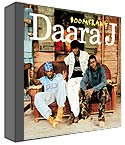Until the orange flier arrived last week, Babacar Ndiaye had no idea that an old friend was coming to town.
The friend in question is Faada Freddy, a member of Daara J, a three-person Senegalese hip-hop group that is playing in this month's Lincoln Center Festival, but is largely unknown to American - or Lincoln Center - audiences.
Mr. Ndiaye, who works in a shop at 221 West 116th Street in Harlem, doesn't really fall into either group. But thanks to an aggressive and focused marketing campaign, he soon will.
"This is my boy," Mr. Ndiaye said, pointing to Faada's photo on the flier. "I am from the same place" - Dakar, the Senegalese capital - "I know his mother, father, sister, whole family."
So of course he is planning to go, Mr. Ndiaye said. "Everybody is coming,"
That is good news for the festival, which starts today. Founded in 1996 as a celebration of Western and non-Western artistic forms, the Lincoln Center Festival, perhaps more than any other in the city, relies on the enthusiasm of local foreign residents - like expatriates from Senegal, a former French colony in West Africa - to fill seats. Roughly 20 percent of festival audience members in recent years have been newcomers to Lincoln Center, officials say.
Reaching first-time theatergoers is one of the most sought-after goals of theater owners and producers. Not only does it fills seats today, but it may also help fill seats tomorrow and the day after. By getting newcomers to overcome their initial reluctance, the theory goes, these people will be more likely to attend other productions in the future, perhaps even becoming regular theatergoers.
With the festival there are other benefits, said Nigel Redden, the festival director. People from their home country are vital to helping the performers feel at home, he said, and they also make the regular Lincoln Center visitor feel he has come to something genuinely different.
"If you have Koreans coming to pansori, and Brazilians coming to see Carlinhos Brown, it reinforces its importance for the audience," Mr. Redden said, referring to a type of Korean opera and the popular Brazilian troubadour. "It feels it has come to a performance that is very much part of another culture."
But getting to those ethnically diverse audiences isn't always easy, and usually depends on a combination of narrowly focused marketing, a familiarity with foreign customs, and old-fashioned shoe leather. Broadway, for example, has long been tested by efforts to diversify its audience, to varying degrees of success. Last year's revival of "A Raisin in the Sun," starring Sean Combs and Phylicia Rashad, succeeded in part by tapping into an African-American audience that rarely comes to Broadway shows. At the same time, however, the producers of "Bombay Dreams," the Bollywood-inspired musical that opened six weeks after "Raisin," failed to expand their audience beyond the local South Asian community and eventually lost most of its $14 million capitalization.
To be sure, Lincoln Center Festival employs a raft of traditional methods, like news conferences and cocktail parties at various embassies and consulates. But officials say that often nothing works better than a well-placed flier.
"A lot of it really is guerrilla marketing," said Erica D. Zielinski, the festival's general manager, who oversaw much of this year's effort. "But if you hit the right vein, things really begin to pop."
For example, for the United States premiere of "I La Galigo," the avant-garde director Robert Wilson's adaptation of an Indonesian epic, members of the Lincoln Center marketing team - read, interns - approached Indonesian mosques in Long Island City and Indonesian restaurants in Park Slope. It dropped fliers at an Indonesian-owned bank on Wall Street, a South Asian martial arts studio in the Flower District, and even a couple of yoga studios in SoHo.
That sort of effort requires a knowledge of ethnic enclaves like Elmhurst, Queens - where Indonesian businesses are common - or Little Senegal, a rugged strip of African-owned music shops, hair salons and storefront boutiques along West 116th Street.
To tap into such communities, the festival also relies on specialists like Sergei Danilian, an Armenian promoter who started his production company, Ardani Artists Management, in the early 1990's. Since then, he has brought a steady stream of Russian performers to the United States, notably the Bolshoi Ballet, the Kirov Ballet, the Kirov Opera and the Fomenko Theater, all of which have appeared at Lincoln Center.
Mr. Danilian estimates that there are more than a million Russian speakers living in the New York-New Jersey-Connecticut area, and he relies on a bevy of methods to get the word out, including direct mail, television advertising (there are at least five Russian TV stations in the United States) and radio (three stations in New York alone). But his most persuasive skill may be his connection to the local community, including ticket sellers in Brighton Beach, where signs with Cyrillic lettering hang in almost every window and newsdealers pile up dozens of Russian-language publications.
Here, tickets are sold in the traditional fashion, in small kiosks tucked away in the corners of bookstores or mobile phone shops or out of the box office of large theaters like the 1,421-seat Millenium in Brighton Beach, which features a large restaurant and authentic Russian pop, dance and classical stars almost every weekend. Orders over the phone or via the Internet are less common, particularly for those Russian-speakers whose English is limited.
With no major Russian acts on this year's bill, the festival does not have a major presence in Brighton Beach this year, but fall and winter shows by Russian performers at Avery Fisher Hall are already drawing interest.
"My customers ask me how I can purchase tickets," said Nona Petrova, who sells tickets from behind a desk at the St. Petersburg Bookstore on Brighton Beach Avenue. "Many, many people." Her only problem, she said, is she doesn't have the actual tickets; she has to direct them to make a call, a method that Mr. Danilian says will cost them sales.
"Russians always like to feel the ticket in their hands - they're not going to use Fresh Direct," he said, referring to the online grocery seller. "Because they like to come to the market and smell the fruit."
For all the efforts of wranglers like Mr. Danilian and festival officials, the most effective promoters are often the artists themselves. Daara J, for example, was recently interviewed on a Senegalese show on WPAT-AM radio in the Wolof, an indigenous language. And last weekend, Shen Wei, a noted Chinese choreographer whose "New Work" is having its world premiere at the festival, organized a news conference for Chinese media, renting out space at a Holiday Inn in Chinatown.
"In some cases, there's a sense that this is New York and if you perform here, you better damn well do your best," Mr. Redden said. "They want an audience that is keyed into what they are doing."
An audience like the men gathered in Mr. Ndiaye's shop on West 116th Street. One of them, Magatt Diop, 29, said he had been to Lincoln Center once before: to see the Senegalese superstar Youssou N'Dour. He will be returning again to see Daara J.
"It's like everybody is getting bigger now," Mr. Diop said with a note of pride. "A lot of artists from Senegal are performing at Lincoln Center. It's very much happiness."


